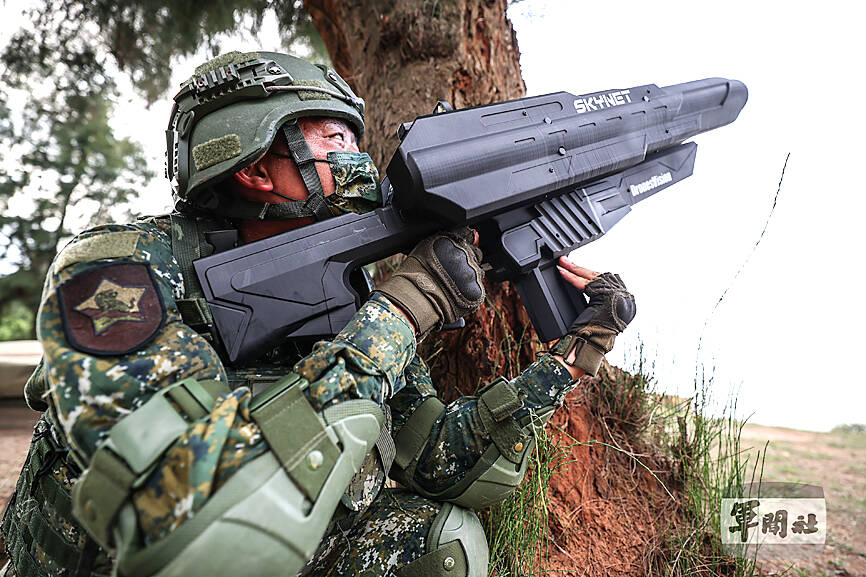A draft act to overhaul military base security and ban the use of drones near their premises cleared the first reading at the Legislative Yuan in Taipei yesterday.
Democratic Progressive Party (DPP) legislators Wang Ting-yu (王定宇) and Michelle Lin (林楚茵) said they proposed the legislation because security standards at military bases and during military drills are based on administrative orders.
Such orders are widely considered a weak legal basis and would be overruled if they are found to conflict with other laws, they said.

Photo courtesy of the Military News Agency
The draft act defines patrol methods, safety measures and bans practices that might compromise military base security, including the use of civilian drones.
The proposed legislation comes amid reports of increased civilian drone intrusions near military facilities on outlying islands, with the activity suspected to come from China.
The draft is next to be discussed by the National Defense and Foreign Affairs Committee.
The draft seeks to provide a legislative basis for patrols, guard duty, safety measures, restrictions, bans, contingency measures, reparations and punitive measures, Wang and Lin said.
The draft would also apply to security measures at the Presidential Office Building and the National Security Bureau, they added.
Under the draft act, people entering military bases without authorization could be fined NT$40,000 to NT$200,000 after a first warning and ordered to leave the base immediately. Those who fail to comply with such orders would be fined NT$60,000 to NT$300,000 and could be fined repeatedly. Flying drones would be banned over military drill areas, training areas or military bases, and contravention would lead to fines of NT$60,000 to NT$300,000, with repeated fines possible.
The draft also defines eight circumstances in which base commanders, on-duty military units, noncommissioned officers, guards and sentries are authorized to use weapons.
Guards and sentries must take necessary precautions and should only use weapons under the orders of a base commander, an officer on duty or a noncommissioned officer, the draft says.
Guards and sentries must warn a person before they raise or use weapons against them and must file a report with their commanding officer after such an incident, the draft act says.
People who are found recording video footage, taking pictures, sketching or taking notes at military facilities, as well as measuring their premises, would face prison terms of six months to three years, it says.
The draft also bans photography and recording equipment, as well as any other equipment that could compromise military security, at military bases.
People found to have such equipment would be warned and asked to hand over their equipment, and if they do not heed the warning, they would be banned from the site and fined NT$10,000 to NT$50,000, the draft says.

Right-wing political scientist Laura Fernandez on Sunday won Costa Rica’s presidential election by a landslide, after promising to crack down on rising violence linked to the cocaine trade. Fernandez’s nearest rival, economist Alvaro Ramos, conceded defeat as results showed the ruling party far exceeding the threshold of 40 percent needed to avoid a runoff. With 94 percent of polling stations counted, the political heir of outgoing Costa Rican President Rodrigo Chaves had captured 48.3 percent of the vote compared with Ramos’ 33.4 percent, the Supreme Electoral Tribunal said. As soon as the first results were announced, members of Fernandez’s Sovereign People’s Party

MORE RESPONSIBILITY: Draftees would be expected to fight alongside professional soldiers, likely requiring the transformation of some training brigades into combat units The armed forces are to start incorporating new conscripts into combined arms brigades this year to enhance combat readiness, the Executive Yuan’s latest policy report said. The new policy would affect Taiwanese men entering the military for their compulsory service, which was extended to one year under reforms by then-president Tsai Ing-wen (蔡英文) in 2022. The conscripts would be trained to operate machine guns, uncrewed aerial vehicles, anti-tank guided missile launchers and Stinger air defense systems, the report said, adding that the basic training would be lengthened to eight weeks. After basic training, conscripts would be sorted into infantry battalions that would take

EMERGING FIELDS: The Chinese president said that the two countries would explore cooperation in green technology, the digital economy and artificial intelligence Chinese President Xi Jinping (習近平) yesterday called for an “equal and orderly multipolar world” in the face of “unilateral bullying,” in an apparent jab at the US. Xi was speaking during talks in Beijing with Uruguayan President Yamandu Orsi, the first South American leader to visit China since US special forces captured then-Venezuelan president Nicolas Maduro last month — an operation that Beijing condemned as a violation of sovereignty. Orsi follows a slew of leaders to have visited China seeking to boost ties with the world’s second-largest economy to hedge against US President Donald Trump’s increasingly unpredictable administration. “The international situation is fraught

GROWING AMBITIONS: The scale and tempo of the operations show that the Strait has become the core theater for China to expand its security interests, the report said Chinese military aircraft incursions around Taiwan have surged nearly 15-fold over the past five years, according to a report released yesterday by the Democratic Progressive Party’s (DPP) Department of China Affairs. Sorties in the Taiwan Strait were previously irregular, totaling 380 in 2020, but have since evolved into routine operations, the report showed. “This demonstrates that the Taiwan Strait has become both the starting point and testing ground for Beijing’s expansionist ambitions,” it said. Driven by military expansionism, China is systematically pursuing actions aimed at altering the regional “status quo,” the department said, adding that Taiwan represents the most critical link in China’s